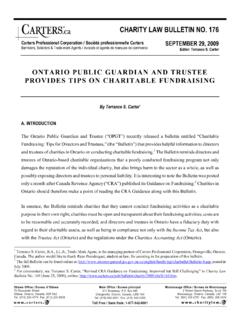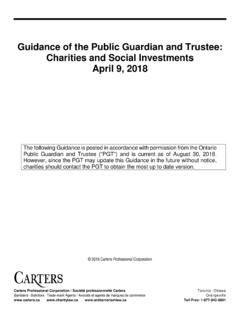Transcription of Guardianship Investigations - The Role of the Public ...
1 OFFICE OF THE Public guardian AND trustee Guardianship Investigations The Role of the Public guardian and trustee 1 2 Office of the Public guardian and trustee Guardianship Investigations ISBN 0-7794-3011-5 Queen s Printer for Ontario, 2006 Reprinted in 2012 Disponible en fran ais 3 THE ROLE OF THE OFFICE OF THE Public guardian AND trustee IN Guardianship Investigations QUESTIONS AND ANSWERS 1. What is the purpose of the Office of the Public guardian and trustee s (OPGT) Guardianship investigation service? This service helps to protect mentally incapable adults who are suffering, or at risk of suffering, serious harm.
2 Severe self-neglect, physical abuse and financial exploitation of incapable people are some of the problems that this service can, in certain circumstances, help to resolve. 2. How does this service work? People concerned about an adult who may be mentally incapable and at serious risk can contact the OPGT. If it appears that a person is mentally incapable and at serious risk of harm, the OPGT will conduct an investigation if no alternative solution can be found. The investigation may result in the court appointing the OPGT as the incapable person s guardian on a temporary basis. This allows the office to make important decisions on the person s behalf. It is important to note that this is not an immediate, emergency crisis response service.
3 The OPGT has no authority to make decisions for the person during an investigation or while the matter is before the courts. 3. What is the legal basis for this service? This service is mandated under the Substitute Decisions Act which was proclaimed in 1995. 4. How does the OPGT become aware of these situations? Anyone may contact the OPGT, by telephone or mail, to express concerns about a person who may be incapable and at serious risk. 4 The telephone number is 416-327-6348 or toll-free at 1-800-366-0335 or TTY: 416-314-2687. The address is: Guardianship Investigations Unit The Office of the Public guardian and trustee 595 Bay Street, Suite 800 Toronto, ON M5G 2M6 5.
4 Will the identity of the person making the referral to the OPGT remain confidential? In accordance with the Freedom of Information and Privacy Act, the OPGT tries to safeguard the privacy of people who make referrals. The office cannot guarantee, however, that their identities, or the nature of the concerns, will remain confidential. If the OPGT applies to court to become the guardian then the information given to the court becomes available to the Public . 6. Aren t people entitled to choose how they live, even if it involves risk? Personal autonomy and the right to make individual choices even bad choices are fundamental values in our society. But some people due to illness, injury or other causes lack the mental capacity to make their own choices.
5 As a result, they are extremely vulnerable to neglect, abuse and exploitation. The key is finding the balance between respecting the rights of capable adults while protecting those who cannot protect themselves. The law has safeguards, including a court process, to ensure that people s decision-making rights are not altered without careful consideration and due process. 7. When is a person considered to be mentally incapable ? A person is mentally incapable of managing property if he or she cannot understand relevant information or cannot appreciate what may happen as a result of decisions they make, or do not make, about their finances. A person may be able to make certain types of decisions, but not others.
6 For example, a person may be unable to make decisions about finances, but may still be able to make decisions about personal matters such as where he or she lives. 58. What level of harm must be alleged before an investigation can be initiated? The law requires the OPGT to investigate if a person is alleged to be incapable and suffering, or at risk of suffering, serious adverse effects of a financial or personal nature as a result. With respect to finances, serious adverse effects includes loss of a significant part of one s property or failure to provide the necessities of life for oneself or dependents . Incapacity may, for example, lead a person to give large sums of money away to strangers or to face loss of his or her home for failure to pay taxes.
7 An incapable person may face starvation or eviction if he or she cannot look after paying rent or buying food. With respect to personal welfare, serious adverse effects includes serious illness or injury, or deprivation of liberty and personal security . Incapacity may, for example, result in a person being unable to remove him or herself from a very dangerous situation or to take steps to stop physical or sexual abuse. 9. Is a Guardianship investigation and application to court the only solution to these problems? No. There are often other solutions that are more appropriate in particular situations. This is especially true if there is an immediate physical crisis.
8 As noted above, an investigation will be of no assistance if a crisis response service is needed in an emergency. For example, if a person is experiencing an acute and immediate medical crisis, a health professional may be able to provide treatment on an emergency basis, without consent. If the criteria for involuntary examination at a psychiatric facility are met, a doctor, a Justice of the Peace or a police officer can require an examination. In some circumstances, the local Community Care Access Centre may be able to arrange a crisis admission to a long-term care facility. If there are concerns that a guardian or a person handling a power of attorney is mismanaging an incapable person s money, anyone can ask the court to review the matter.
9 This is usually the most appropriate course of action when there is a dispute among family members about how one member is handling a power of attorney for an incapable relative. 6 If an incapable person needs a guardian of property, this can sometimes be accomplished through a capacity assessment process without the need for an investigation . More information about the process is contained in the information pamphlet entitled The Capacity Assessment Office which can be obtained by calling 416-327-6766, TTY: 416-314-2687 or toll-free at 1-800-366-0335. There are often other solutions available in addition to the ones described above. It always depends on the particular situation.
10 A Guardianship investigation can be an intrusive step and is considered a last resort, after everything else has been attempted. 10. How does the OPGT decide which cases should be investigated? When the OPGT is contacted, staff will interview the person who made the referral. This is usually done over the telephone and is intended to obtain relevant background information. If the case does not appear to fall within the OPGT s mandate, information about other appropriate resources will be provided, if possible. If initial inquiries suggest that both incapacity and serious risk may exist, then all the appropriate alternative solutions to the problem will be discussed with the person making the referral.









